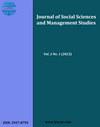Perceptions of educational stakeholders on the introduction of entrepreneurship subjects at secondary schools in Zanzibar
引用次数: 1
Abstract
This study aimed at examining the perceptions of educational stakeholders on the introduction of entrepreneurship subjects at secondary schools in Zanzibar and the challenges of its integration. The study employed both qualitative and quantitative approaches. Questionnaires, focus group discussions, and interviews were used in data collection. A sample of 67 respondents, 30 students, 30 teachers, 6 headteachers, and 1 educational officer was used. The study employed stratified sampling and purposive sampling techniques in selecting the sample. Purposive sampling was used to select the teachers, headteachers, and the educational officer while stratified sampling was used to sample the students. Interviews were conducted with headteachers and educational officers whereas focus group discussions and questionnaires were administered to students and teachers respectively. The data collected through the questionnaires were analyzed with the aid of Statistical Package for Social Sciences (SPSS) version 20, while data collected using interviews and focus group discussion was analyzed qualitatively. The results were unequivocal as about 89.6% of respondents accepted the idea of the introduction of entrepreneurship subjects at secondary schools. Meanwhile, the findings showed that the integration would be faced with a myriad of challenges such as a shortage of competent entrepreneurship subject teachers, a shortage of teaching and learning materials, and the use of traditional teaching methods. The study recommended that the entrepreneurship subject can be introduced at secondary schools in Zanzibar but the use of modern teaching methods, frequent training of entrepreneurship subject teachers, and teaching entrepreneurship subject in an appropriate environment must be respected for better performance.教育利益相关者对桑给巴尔中学开设创业课程的看法
本研究旨在研究教育利益相关者对在桑给巴尔中学引入创业学科的看法及其整合所面临的挑战。这项研究采用了定性和定量两种方法。数据收集采用问卷调查、焦点小组讨论和访谈等方法。调查对象为67人,学生30人,教师30人,校长6人,教育官员1人。本研究采用分层抽样和目的抽样的方法来选择样本。对教师、校长和教官采用目的抽样,对学生采用分层抽样。与校长和教育人员进行访谈,并分别对学生和教师进行焦点小组讨论和问卷调查。通过问卷收集的数据使用SPSS (Statistical Package for Social Sciences)第20版进行分析,而通过访谈和焦点小组讨论收集的数据进行定性分析。调查结果非常明确,约89.6%的受访者接受在中学开设创业课程的想法。同时,研究结果表明,整合将面临创业学科师资短缺、教学材料短缺、传统教学方法使用等诸多挑战。研究建议,可以在桑给巴尔的中学开设创业课程,但必须尊重现代教学方法的使用、对创业课程教师的频繁培训以及在适当的环境中教授创业课程,以取得更好的成绩。
本文章由计算机程序翻译,如有差异,请以英文原文为准。
求助全文
约1分钟内获得全文
求助全文
来源期刊

Journal of Social Sciences and Management Studies
Social Sciences and Management Studies-
自引率
0.00%
发文量
0
期刊介绍:
Journal of Social Sciences and Management Studies (ISSN: 2957-8795) is a peer reviewed journal focuses on integrating theory, research and practice in the area of management and social sciences. The journal discusses the distinctive disciplinary practices within the sciences of the management and social field and examines examples of these practices. In order to define and exemplify disciplinarity, the journal fosters dialogue ranging from the broad and speculative to the microcosmic and empirical. In considering the varied interdisciplinary, trans-disciplinary or multidisciplinary work across and between the social, natural and applied sciences, the journal showcases interdisciplinary practices in action. The focus of papers ranges from the finely grained and empirical, to wide-ranging multi-disciplinary and transdisciplinary practices, to perspectives on knowledge and method.
 求助内容:
求助内容: 应助结果提醒方式:
应助结果提醒方式:


